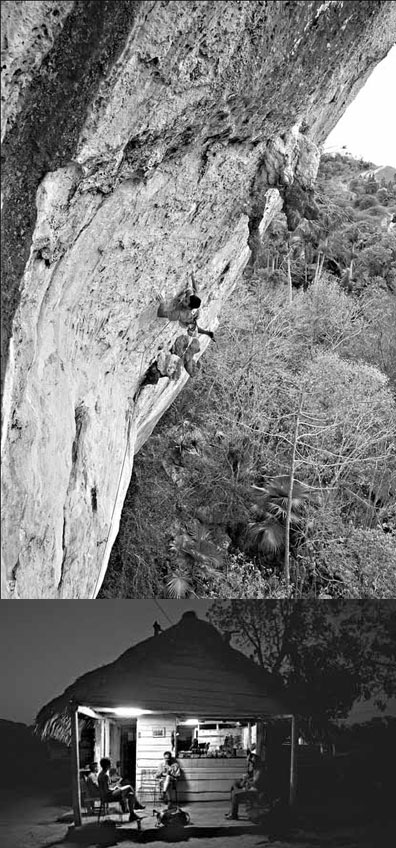Climbing paradise forbidden
Updated: 2012-07-15 07:52
By Alex Lowther(The New York Times)
|
|||||||
|
Valle de Vinales, in Cuba. Climbing has been banned here since 2003. Climbers relax at a fruit stand. Photographs by alex Lowther for The New York Times |
VALLE DE VINALES, Cuba - Here, the mountains weren't pushed up from underneath, as mountains usually are. In this national park and Unesco World Heritage site, everything but the mountains fell down. The mogotes, islands of limestone, are gently domed, like loaves of crusty bread, but the sides seem to have been cleaved off, leaving terrain that drops precipitously to the valley floor.
In the late 1990s, rock climbers found a paradise where the walls of the mogotes are too steep for the otherwise ubiquitous crawling vines and striving trees. Overhangs, some 150 meters tall, are covered with chandeliers of stalactites and blobs and pockets, all perfectly formed for human hands and feet to climb from the bottom of a cliff to its top.
Soon, locals caught on, and Vinales became a top destination for climbers from Europe, Canada and the United States. Hundreds of routes went up the major mountain faces in the valley, and for years visiting climbers had essentially free rein.
No longer. Climbers here, a three-hour drive west of Havana, the capital, are wrestling with the prohibition of their sport, which has been enforced since the beginning of this year.
Jens Franzke, a climber from Dresden, Germany, here with his wife, Ina, for three weeks, was fed up. "It feels like East Germany before the fall of the Berlin Wall," he said. "There are all these rules, and none of them make any sense."
Mr. Franzke, 46, and his wife had been forced to stop climbing multiple times, threatened by park guards and told that the "Cuba Climbing" guidebook they were using to find routes in the valley was illegal to use because the authors do not live in Cuba.
"It's a real shame because it's such a paradise," Mr. Franzke said. The couple had climbed nearly every day they wished by evading the rules and the guards, but "we will never come back," he said.
This is the main worry for residents and climbers. Vinales is a bustling town of about 17,000 with more than 300 private boardinghouses that rent rooms to tourists. All that has allowed the valley to overcome the poverty typical across the country.
Cuban climbers rely on tourists to donate shoes, harnesses and ropes to climb. Equipment is not available, and even if it were, it would cost too much in a country where government salaries average $15 to $25 a month. Without tourists, climbing would become, essentially, impossible.
In 2003, the state deemed climbing a factor in peligrosidad, a vague designation of being dangerous to the state. It is an offense punishable by imprisonment.
Many of the cliffs where climbing takes place are part of the national defense plan in case of attack, and climbers suspect that state security officials are worried that the Cubans and foreigners are there organizing against the government.
Owners of casas particulares, as the private boardinghouses are called, said warnings about the rules were overblown. Oscar Jaime Rodriguez, owner of a boardinghouse that is the de facto base camp for climbers in the valley, sought to quiet fears. "They are always saying, 'It's prohibited, it's prohibited,' but climbers still come and they still climb," he said. "It's worth it." (Since reporting there concluded at the end of March, climbers have said enforcement of the no climbing rule may have become more lenient.)
On their last day in Cuba, after an unmolested climbing session in warm early morning sun and a "coco loco" cocktail in the shade, the Franzkes reconsidered their vow never to return.
"Maybe all of the not so good stuff about Cuba will leave my memory," Jens Franzke said. "I'll just remember the beautiful people, the red soil, the salsa." Mr. Franzke looked at the drink in his hand, smiled and said, "The coco loco." He looked in the direction of the mogotes, and added, "And the spectacular climbing."
The New York Times
(China Daily 07/15/2012 page10)
